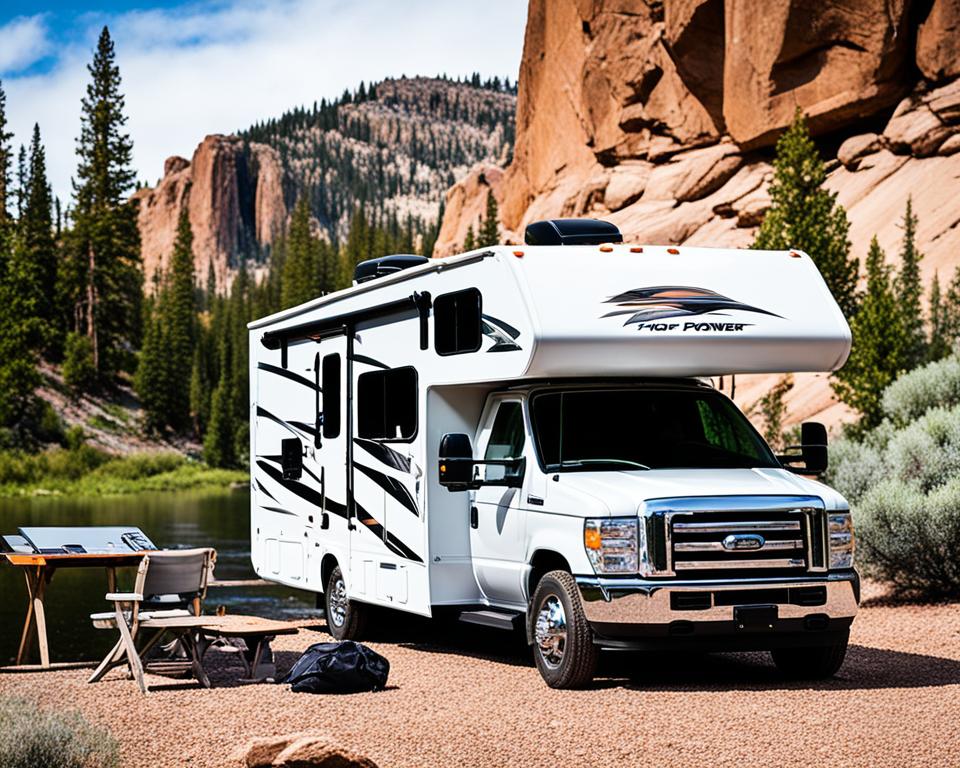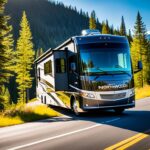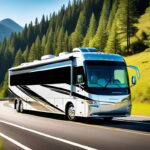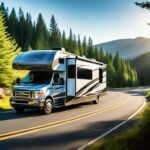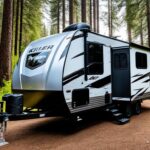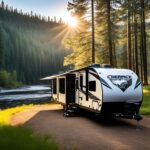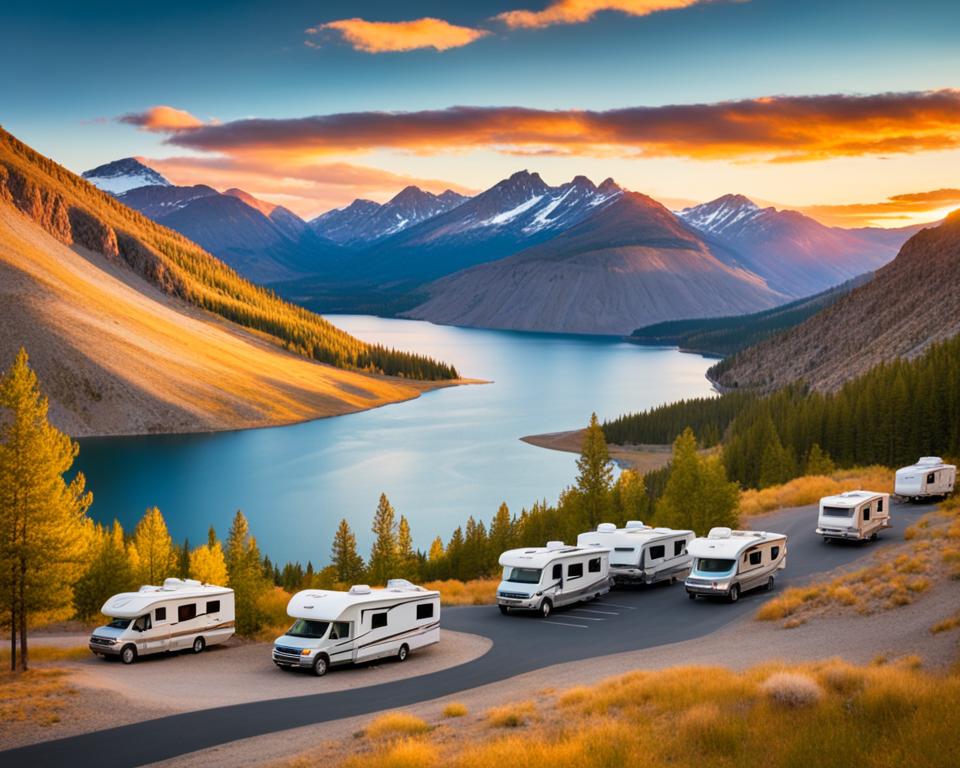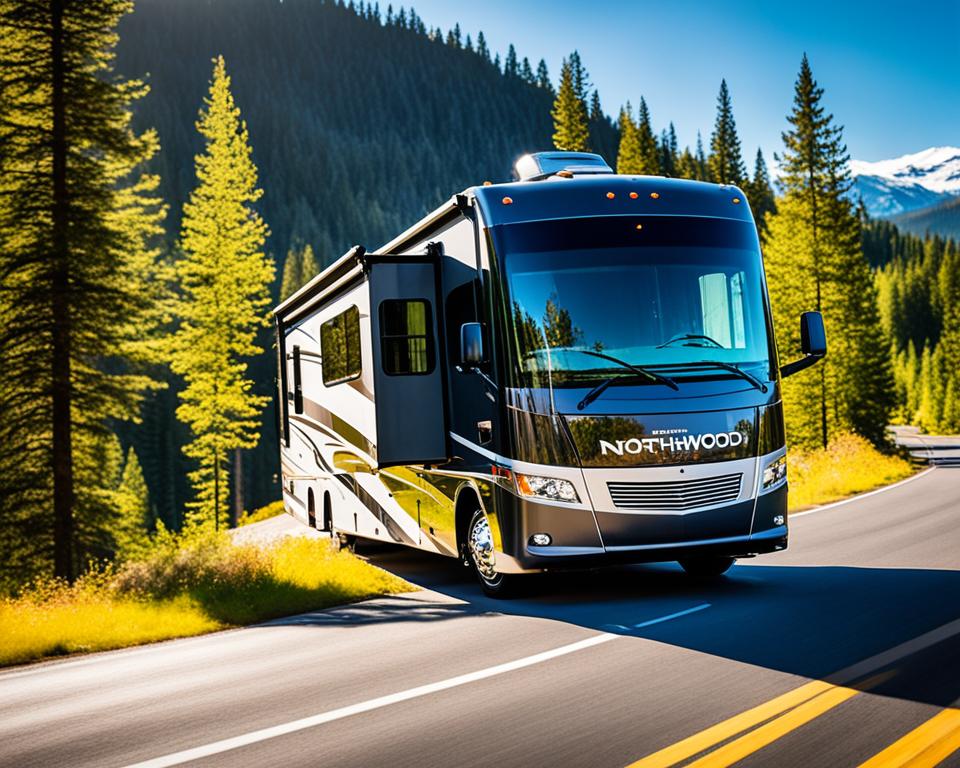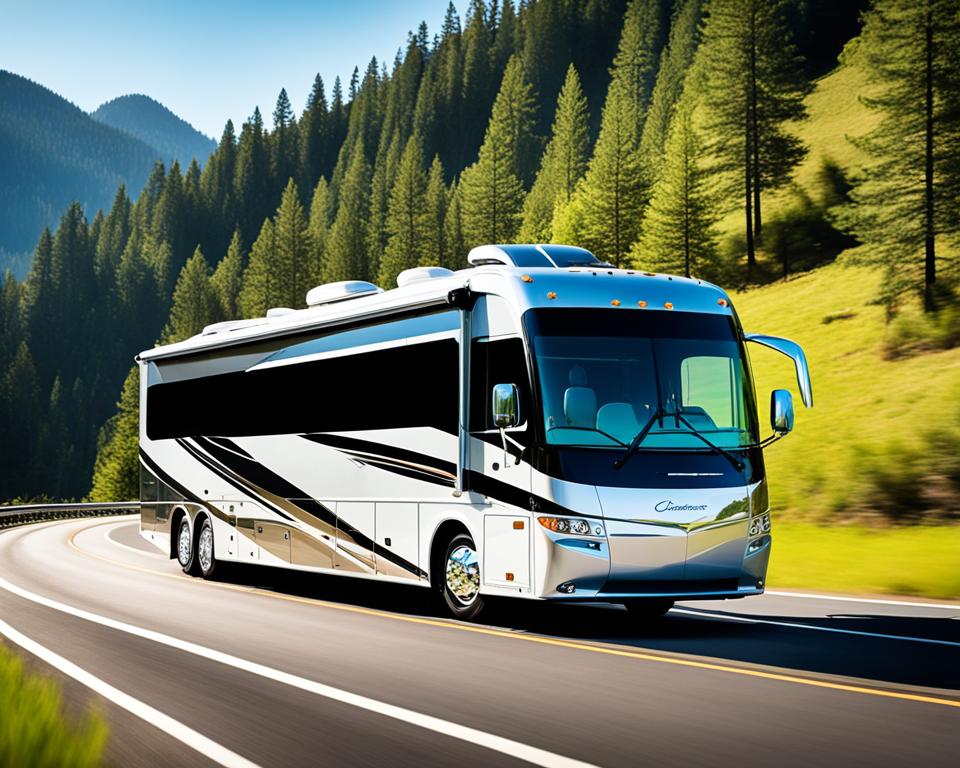RV boondocking on public lands is a popular and enjoyable way to camp. However, it is essential to follow certain etiquette guidelines to ensure a respectful and harmonious camping experience for everyone. This section will provide tips on proper RV boondocking behavior, responsible boondocking practices, and guidelines for ethical RV off-grid camping.
Key Takeaways:
- Follow proper RV boondocking behavior to ensure respect for others.
- Practice responsible boondocking practices to minimize impact on the environment.
- Obtain permission when overnighting in parking lots and limit your stay to one night.
- Respect stay limits set by land management agencies to prevent overcrowding.
- Be prepared and self-sufficient when boondocking to ensure a safe and enjoyable experience.
Obtaining Permission and Overnighting in Parking Lots
When engaging in RV boondocking, there are various locations available for overnight stays, including parking lots provided by well-known retailers such as Walmart and Cabela’s. However, it is important to remember that even in these convenient spots, certain guidelines must be followed to uphold ethical RV off-grid camping practices and respectful RV boondocking etiquette.
Prior to setting up camp in a parking lot, it is crucial to obtain permission from the store manager. This can be done by calling ahead and speaking to a real person at the store. By obtaining permission, you demonstrate your respect for the establishment and ensure a positive relationship between boondockers and businesses.
While overnighting in parking lots, it is essential to limit your stay to one night only. Arriving late and leaving early prevents the occupation of valuable parking spaces and allows other travelers to utilize the area. This courteous practice ensures fairness and consideration for fellow RV boondockers.
As a way to show gratitude for the hospitality provided by the establishments, it is recommended to make a purchase at the store. This simple gesture demonstrates appreciation for their willingness to accommodate RVers and encourages a positive perception of ethical RV off-grid camping within the community.
Note: Dumping gray or black water in parking lots is strictly prohibited and should never be done. It is essential to dispose of waste appropriately and responsibly in designated locations.
To maintain a peaceful environment for fellow boondockers, it is important to keep noise levels to a minimum. Respecting the tranquility of the surrounding area ensures a harmonious camping experience for everyone.
“Obtaining permission to stay in parking lots and showing appreciation for the hospitality provided by establishments sets a positive example for ethical RV off-grid camping.”
Guidelines for Overnighting in Parking Lots
| Guidelines | Explanation |
|---|---|
| Obtain Permission | Call ahead and speak to a real person to obtain permission from the store manager before setting up camp. |
| Limit Stay to One Night | Arrive late and leave early to avoid occupying valuable parking spaces. |
| Show Appreciation | Make a purchase at the store as a way of showing gratitude for their hospitality. |
| Avoid Dumping Waste | Never dump gray or black water in parking lots; dispose of waste appropriately in designated areas. |
| Maintain Noise Control | Keep noise levels to a minimum to ensure a peaceful environment for fellow boondockers. |
Boondocking Etiquette on Public Lands
When boondocking on public lands, it is important to adhere to certain guidelines to ensure a positive and responsible camping experience. This section will outline the key boondocking rules and etiquette to follow while staying on public lands. By practicing ethical RV off-grid camping, you can contribute to the preservation of these natural areas and create a harmonious community of fellow boondockers.
Respecting Stay Limits
One of the most crucial aspects of boondocking on public lands is respecting the stay limits set by land management agencies. Most BLM (Bureau of Land Management) and National Forest lands have a 14-day limit to prevent long-term occupation and overcrowding. It is essential to adhere to these stay limits to allow others the opportunity to enjoy these scenic locations. Regularly check the specific regulations for the area you are visiting and plan your stay accordingly.
Ensuring Privacy and Peaceful Camping
When selecting a campsite, it is important to leave space between your RV and other boondockers. Respecting their privacy and personal space creates a more peaceful and enjoyable camping experience for everyone. Keep noise levels to a minimum, especially during quiet hours, and be mindful of your generator usage. By practicing good neighbor practices for RV boondockers, you can foster a respectful and considerate environment among fellow campers.
Parking in Designated Sites
While boondocking on public lands, it is crucial to park only in designated sites to prevent damage to vegetation and preserve the natural beauty of the area. These designated sites are often marked with posts, signs, or existing fire rings. Parking outside of designated areas can cause harm to fragile ecosystems and disrupt wildlife habitats. Following this RV boondocking rule helps ensure the sustainability of these beautiful landscapes for future generations.
Following Local Regulations
Each boondocking area may have specific regulations regarding campfires and generator usage. It is important to familiarize yourself with these rules and comply with them. Some areas may allow campfires only in designated fire rings, while others may restrict campfires altogether due to fire hazards. Likewise, certain areas may have limitations on generator use during specific hours. By following these local regulations, you contribute to the overall safety and enjoyment of the boondocking community.
Cleaning Up After Yourself
One of the key principles of ethical RV off-grid camping is leaving no trace behind. Always clean up after yourself and leave your campsite in the same condition (or better) than you found it. This includes picking up trash, properly disposing of waste, and extinguishing campfires completely. Respect the natural environment by leaving it pristine for others to enjoy and minimizing your ecological impact.
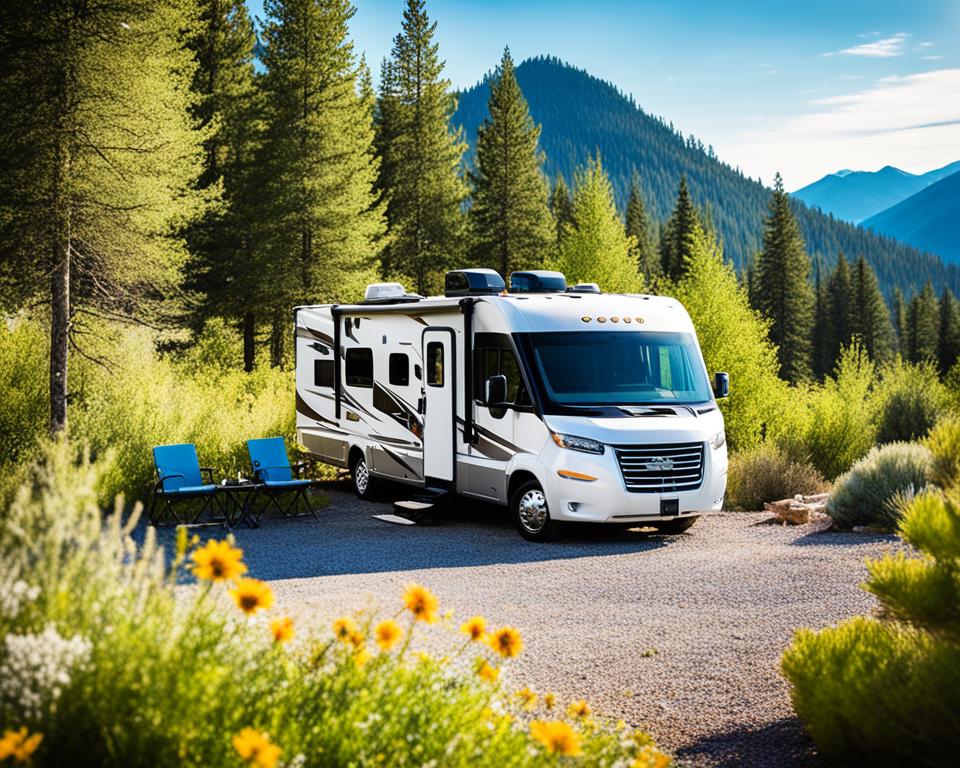
Boondocking Etiquette on Public Lands
| Etiquette Guidelines | Explanation |
|---|---|
| Respect Stay Limits | Adhere to the designated stay limits, typically around 14 days, to prevent long-term occupation and overcrowding. |
| Ensure Privacy and Peaceful Camping | Leave space between your RV and other campers to respect their privacy. Keep noise levels to a minimum, especially during quiet hours, and be mindful of generator usage. |
| Parking in Designated Sites | Only park in designated sites to prevent damage to vegetation and preserve the natural beauty of the area. |
| Following Local Regulations | Familiarize yourself with local regulations regarding campfires and generator usage, and comply with them. |
| Cleaning Up After Yourself | Leave no trace by properly disposing of waste, picking up trash, and thoroughly extinguishing campfires. |
By adhering to these boondocking rules and practicing good neighbor practices for RV boondockers, you can enjoy a fulfilling and respectful camping experience while also preserving the natural environment for future generations.
Creating a Quiet and Clean Campsite
When boondocking, it is important to be considerate of others by keeping noise levels to a minimum. While there may not be set quiet hours on public lands, being respectful and mindful of other campers’ need for peace and quiet is crucial. This means avoiding excessive noise from generators, loud conversations, or blaring music. It’s essential to remember that the primary appeal of boondocking is the tranquility and serenity of nature.
Additionally, maintaining a clean campsite is imperative for responsible boondocking practices. Properly disposing of trash and leaving no trace helps to preserve the natural beauty of the surrounding environment and ensures a positive experience for everyone. Always bring garbage bags and pack out all waste when leaving a boondocking site.
“Responsible boondocking means leaving the campsite just as you found it, or even cleaner.”
Pick up after your pets and keep them under control to prevent any disturbances or conflicts with other campers. This includes properly disposing of pet waste and making sure it doesn’t contaminate the immediate area. Respect any specific rules or regulations regarding pets in the boondocking location you choose.
In terms of campfires, it is crucial to follow all fire safety guidelines and regulations provided. Ensure that fires are fully extinguished before leaving the campsite to prevent the risk of wildfires. It is recommended to bring a portable fire pit or use existing fire rings whenever possible to minimize impact on the natural surroundings.
RV Dry Camping Etiquette Checklist
| RV Dry Camping Etiquette | Checklist |
|---|---|
| Keep noise levels to a minimum | – Avoid excessive noise from generators – Keep conversations and music volumes low – Be mindful of others’ need for peace and quiet |
| Maintain a clean campsite | – Properly dispose of trash – Pack out all waste when leaving – Pick up after pets – Leave no trace |
| Follow fire safety guidelines | – Fully extinguish campfires before leaving – Use existing fire rings or portable fire pits – Respect any fire-related restrictions |
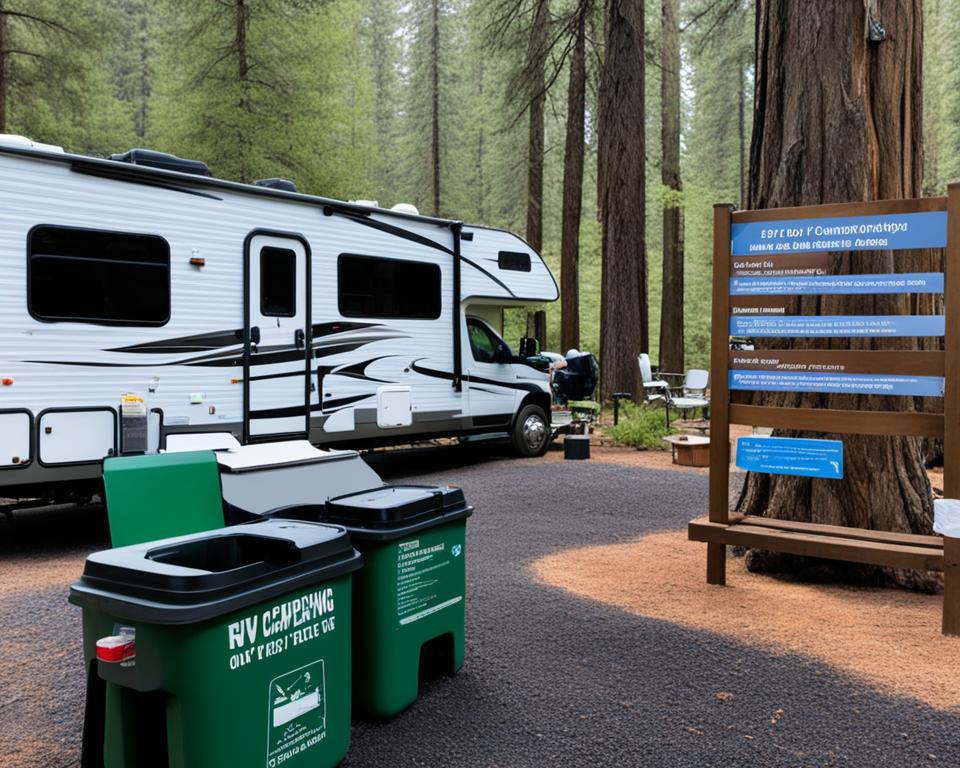
By practicing responsible boondocking practices and observing good neighbor practices, you can contribute to a positive and harmonious boondocking community. Maintaining a quiet and clean campsite not only respects the needs of fellow RV boondockers but also helps to preserve the natural environment for future generations to enjoy.
Courteous Interactions with Other Boondockers
In boondocking areas, it is important to be respectful and considerate of other campers. By following these respectful boondocking tips, you can ensure a pleasant and harmonious camping experience for everyone.
One way to demonstrate respect is by giving other boondockers their space. Avoid parking too close to their campsite, as it could infringe on their privacy and personal comfort. Remember, just as you appreciate your own privacy, so do they.
When encountering fellow boondockers, it is appropriate to greet them and be open to friendly interactions, as long as it aligns with their preferences for socializing. Some campers may prefer their solitude, while others may welcome the opportunity for camaraderie and community.
“Respect for others is the key to a successful boondocking experience. It’s all about treating others how you would like to be treated.”
By maintaining a sense of community, sharing tips and recommendations, and engaging in respectful conversations, you contribute to a positive boondocking atmosphere that benefits all campers.
Remember to always be mindful of others and their preferences, while fostering a sense of unity and respect within the boondocking community.
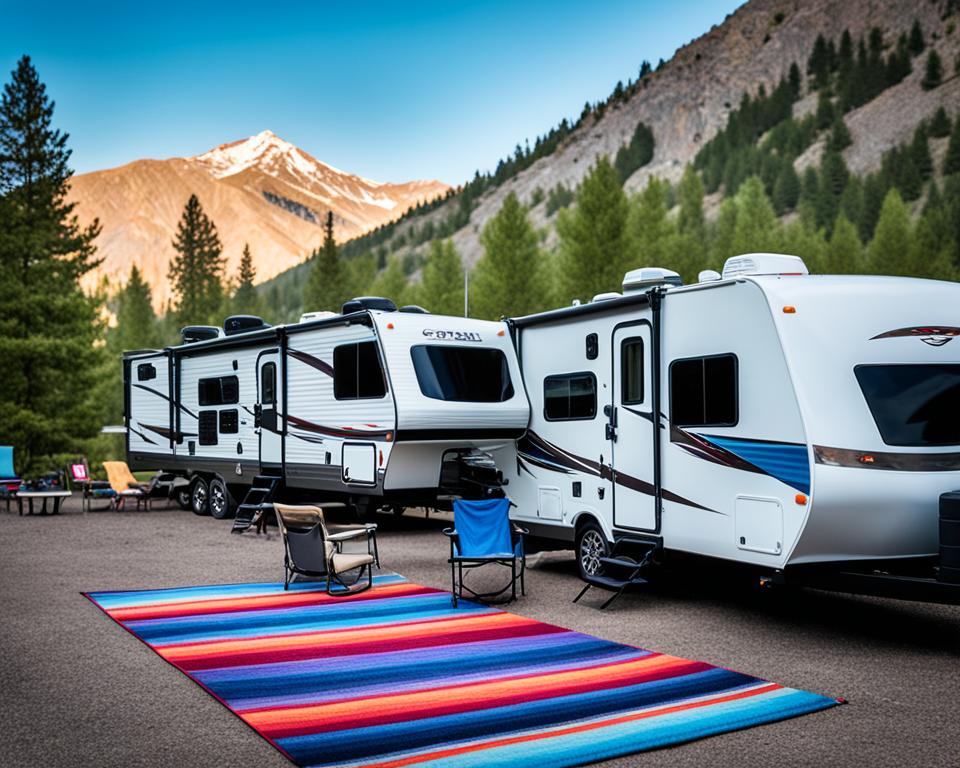
| Respectful Boondocking Tips | Description |
|---|---|
| Park at a respectful distance | Give fellow boondockers their space by avoiding close proximity to their campsite. |
| Be friendly and open to interaction | Greet other boondockers and engage in respectful conversations, fostering a sense of community. |
| Respect personal preferences | Be mindful of others’ need for solitude, while also being open to potential socializing opportunities. |
| Contribute to a harmonious atmosphere | By following respectful boondocking practices, you help create a positive camping experience for all. |
Adhering to Environmental Conservation
When it comes to boondocking, responsible practices that prioritize environmental conservation are of utmost importance. By following these practices, you can minimize the impact on vegetation and wildlife, ensuring the preservation of these natural areas for future generations to enjoy.
Staying on Designated Roads and Camping Spots
One key aspect of responsible boondocking is staying on designated roads and camping spots. This helps protect fragile ecosystems and prevents unnecessary damage to vegetation. Avoid off-roading or creating new paths to maintain the natural integrity of the surroundings.
Proper Waste Disposal and Leaving No Trace
Responsible boondockers understand the importance of proper waste disposal and leaving no trace behind. Packing out everything you bring in, including trash, ensures that these pristine areas remain clean and free from pollution. Dispose of waste in designated receptacles or managed facilities, following any local regulations.
“Take nothing but pictures, leave nothing but footprints.”
Conservation-focused Campfire Practices
When enjoying a campfire during your boondocking adventure, it’s essential to follow conservation-focused practices. Ensure that fires are completely extinguished before leaving the area to prevent the risk of wildfires. Take appropriate measures to minimize the impact on surrounding vegetation.
Protecting Wildlife and Their Habitat
Show respect for the wildlife that call boondocking areas home by observing them from a safe distance and avoiding any disturbance. Keep noise levels down to avoid causing stress to the animals and respect their natural habitat by refraining from trespassing or damaging their environment.
Preserving Natural Resources
Lastly, responsible boondocking involves preserving natural resources. Conserve water by using it sparingly and avoiding unnecessary waste. Be mindful of energy consumption and use sustainable power sources whenever possible, such as solar energy. By adopting these practices, you contribute to the long-term preservation of the environment while enjoying the beauty of RV boondocking.
Consideration for Pets and Noise Levels
When RV boondocking with pets, it is essential to be considerate of other campers and prioritize their comfort. By following these respectful boondocking tips, you can create a positive camping experience for everyone. Start by keeping your pets under control, whether they are on a leash or within the confines of your RV. This ensures that they do not wander into other campsites or disturb fellow campers.
Cleanliness is also crucial when boondocking with pets. Always clean up after them, promptly disposing of waste in designated trash bins. This not only keeps the camping area clean but also shows respect for the natural environment and fellow boondockers.
Furthermore, it is important to be aware of any regulations regarding pets in the area you’re boondocking. Some campgrounds and public lands may have specific guidelines or restrictions for pets, such as leashing requirements or designated pet-friendly areas. By adhering to these regulations, you can ensure a harmonious camping experience and avoid any unnecessary conflicts with other campers or park authorities.
As part of RV dry camping etiquette, it is crucial to maintain a peaceful environment by keeping noise levels to a minimum. Be mindful of your generator usage, especially during quiet hours or in close proximity to other campers. Consider using quieter generators or alternative power sources wherever possible.
In addition, be respectful of your neighbors’ need for peace and quiet. Keep music volume at a reasonable level and be mindful of loud conversations or activities that could disturb fellow campers. Remember, the tranquility of RV boondocking is one of its many appealing aspects, so it is important to maintain a peaceful atmosphere for all to enjoy.
“A peaceful boondocking experience relies on respectful pet ownership and mindful consideration of noise levels.”
Being Prepared and Self-Sufficient
When it comes to RV boondocking, being prepared and self-sufficient is essential for a safe and enjoyable experience. By ensuring you have everything you need, from water to emergency supplies, you can make the most of your off-grid camping adventure. Here are some key guidelines to keep in mind:
- Stock up on essentials: Before heading out for your boondocking trip, make sure you have an ample supply of water, propane, and any other necessary resources. Fill your freshwater tank, check your propane levels, and consider carrying extra supplies in case of an extended stay.
- Create a backup plan: While boondocking, it’s important to be prepared for unforeseen circumstances. Familiarize yourself with the surrounding area and identify nearby amenities such as gas stations, grocery stores, and RV repair shops. Having a backup plan in case of emergencies or unforeseen circumstances will provide peace of mind throughout your trip.
By being self-sufficient and prepared, you can confidently venture into the world of RV boondocking, knowing that you have everything you need to make the most of your time off-grid. Enjoy the freedom and tranquility of the great outdoors while staying safe and comfortable.
Sample Table:
| Essentials | Quantity |
|---|---|
| Water | 80 gallons |
| Propane | 2 full tanks |
| Fuel | Full tank |
| First Aid Kit | Well-stocked |
| Emergency Supplies | Flashlight, batteries, etc. |
Respecting Stay Limits and Moving On
Respecting stay limits is a crucial part of RV boondocking etiquette. These limits, set by land management agencies, help prevent overcrowding and maintain the natural beauty of boondocking areas. By adhering to these guidelines, you not only ensure a positive experience for yourself but also for future boondockers.
When you arrive at a boondocking location, familiarize yourself with the stay limits in place. Most land management agencies, such as BLM and National Forests, have established a maximum stay limit of 14 days. It is important to respect this timeframe to allow others the opportunity to enjoy the same experience.
If you have reached your stay limit, it is time to move on and find another boondocking spot. This practice helps prevent the overuse of specific areas and allows the ecosystem to recover from human impact. It also ensures that other RVers have the chance to experience the beauty of boondocking.
As you prepare to leave, remember to clean up your campsite and properly dispose of any waste. Leave no trace behind, and if possible, try to leave the area better than you found it. This not only shows respect for the environment but also for future boondockers who will come after you.
In summary, respecting stay limits and moving on when your time is up is an essential part of RV boondocking etiquette. By doing so, you contribute to the preservation of these natural areas and promote a sustainable boondocking community.
Conclusion
By adhering to these RV boondocking etiquette tips, you can ensure a respectful and enjoyable camping experience while exploring off-grid. Remember to be considerate of fellow campers, respect the environment, and practice good neighbor practices. By being a responsible boondocker, you contribute to the preservation of these natural areas and foster a harmonious community of like-minded adventurers. Travel responsibly and immerse yourself in the beauty of RV boondocking.
FAQ
What should I do if I want to boondock in a parking lot?
Obtain permission from the store manager before setting up camp. Limit your stay to one night, arrive late and leave early, make a purchase at the store, and do not dump gray or black water in the parking lot.
Are there time limits for boondocking on public lands?
Yes, most BLM and National Forest lands have a 14-day limit. It is important to respect these stay limits to prevent long-term occupation and overcrowding.
What are some guidelines for maintaining a clean and peaceful campsite?
Properly dispose of trash, pick up after pets, extinguish campfires, and keep noise levels to a minimum to ensure a clean and peaceful camping experience for everyone.
How should I interact with other boondockers?
Give them their space, avoid parking too close to their campsite, greet them respectfully, and be open to friendly interactions while respecting their privacy.
How can I practice environmental conservation while boondocking?
Stay on designated roads and camping spots, properly dispose of waste, pack out everything you bring in, and leave no trace to minimize impact on the environment.
What should I consider regarding pets and noise levels while boondocking?
Keep pets under control, clean up after them, be aware of any regulations regarding pets in the area, and maintain low noise levels to ensure a peaceful experience for everyone.
How can I be prepared and self-sufficient while boondocking?
Have enough water, propane, and essentials for your stay, create a backup plan for emergencies, and familiarize yourself with the surrounding area to ensure a safe and enjoyable experience.
Should I adhere to stay limits set by land management agencies?
Yes, to prevent overcrowding and preserve the natural beauty of boondocking areas, it is important to respect stay limits and find another spot once you have reached your limit.

